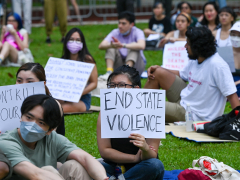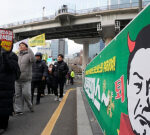Singapore – Masoud Rahimi Mehrzad’s father was in a remote part of Iran when he received the news that he had long dreaded.
His son was to be hanged in Singapore’s Changi Prison.
Suffering from deteriorating health and with just a week’s notice until the execution at dawn on November 29, he was unable to take on the demanding trip to see his son in person for one last time, according to reports.
Instead, the final contact between the father and son came via a long-distance phone call.
Despite a last-ditch legal challenge, Masoud was hanged on the final Friday of November, more than 14 years after he was first arrested for drug offences.
Masoud, 35, became the ninth person to be hanged in Singapore this year.
“With four executions in November alone, the Singaporean government is relentlessly pursuing its cruel use of the death penalty,” said Bryony Lau, Deputy Director for Asia at Human Rights Watch.
Anti-death penalty campaign groups believe that about 50 inmates are currently on death row in Singapore.
Despite opposition from prominent human rights groups and United Nations experts, Singapore claims that capital punishment has been “an effective deterrent” against drug traffickers and ensures the city-state is “one of the safest places in the world”.
A group of UN experts said in a joint statement last month that Singapore should “move from a reliance on criminal law and take a human rights-based approach in relation to drug use and drug use disorders”.

Stories of the plight of death row inmates generally come from activists, who work tirelessly to fight for the rights of those facing the ultimate punishment.
The recent wave of executions has now left them shaken.
“It’s a nightmare,” says Kokila Annamalai, a prominent anti-death penalty campaigner with the Transformative Justice Collective (TJC).
Her work has led her to form a close bond with many death row prisoners.
“They’re more than just people we are campaigning for. They’re also our friends, they feel like our siblings. It’s been very difficult for us personally,” Annamalai told Al Jazeera.
‘Losing another son, he couldn’t accept it’
Like almost all of Singapore’s prisoners on death row, Masoud was convicted for drug offences.
Born in Singapore to an Iranian father and Singaporean mother, he had spent his childhood between Iran and Dubai.
At the age of 17, he returned to Singapore to complete his compulsory national service and it was during this period in his life that he was arrested on drug charges.
In May 2010, aged 20, he drove to meet a Malaysian man at a petrol station in central Singapore. Masoud took a package from the man, before driving away. He was soon stopped by the police. They searched the package and some other bags that they found in the car.
In total, officers discovered more than 31 grams of diamorphine, which is also known as heroin, and 77 grams of methamphetamine.
Masoud was arrested for possessing drugs with the purpose of trafficking.
Under Singapore’s strict laws, anyone caught carrying more than 15 grams of heroin can face the death penalty.
Masoud told police that he was suffering from post-traumatic stress disorder and anxiety. He also blamed an illegal money-lending syndicate for planting the drugs in order to frame him.
His defence did not stand up in court and he was sentenced to death in 2015.

Masoud’s sister, Mahnaz, released an open letter shortly before her brother was hanged last month. She described the pain that the death sentence had inflicted on their father.
“My dad was completely heartbroken, and he has never recovered. One of my brothers died when he was 7 years old, from appendicitis … losing another son, he couldn’t accept it,” she wrote.
Masoud had fought tirelessly to appeal his conviction, but his numerous legal challenges failed, as did a plea for clemency to Singapore’s President Tharman Shanmugaratnam.
Before his own execution, Masoud’s sister recounted how her brother had dedicated his time on death row to helping other prisoners with their own legal battles.
“He’s very invested in helping them find peace,” Mahnaz said.
“He feels it’s his responsibility to fight for his life as well as the others, and he wishes for everyone on death row to feel the same motivation, to be there for each other,” she said.
‘People start to care deeply’
In October, Masoud was one of 13 death row prisoners who won a case against the Singapore Prison Service and the Attorney General ‘s Chambers, after they were deemed to have





